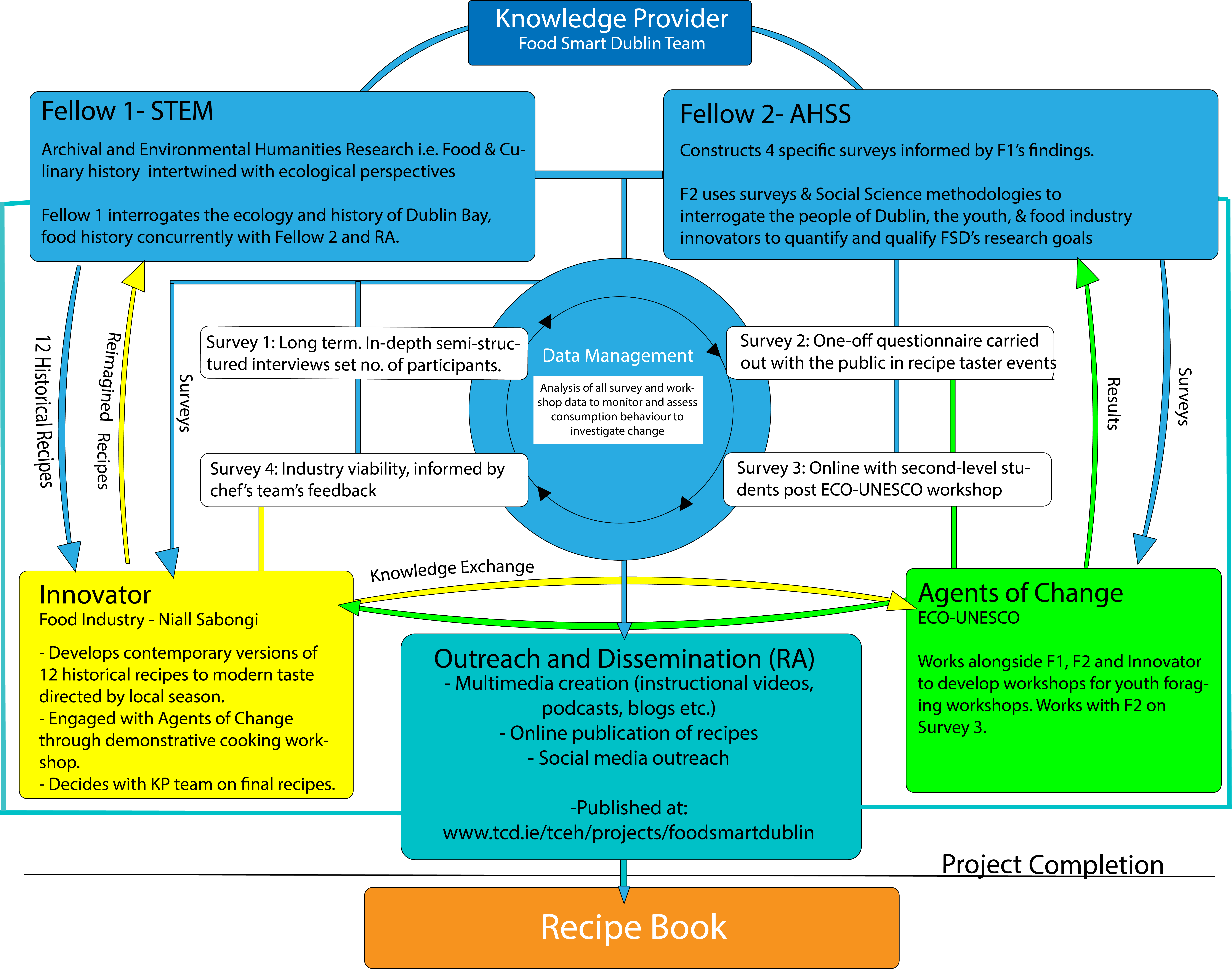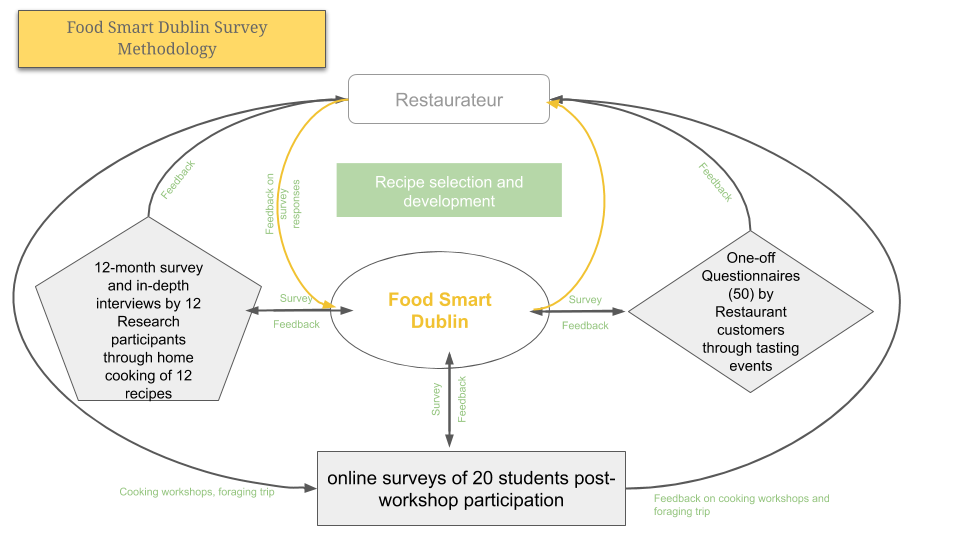Methodologies
We develop the FoodSmart Dublin concept as a transdisciplinary project that applies methodologies in the humanities and natural sciences to integrate insights from history, digital humanities and marine ecology. We also develop FoodSmart Dublin as a transdisciplinary concept of knowledge exchange involving academia, businesses, NGOs and the public. In a wider context, the project implements ideas of the ‘Humanities for the Environment’ approach (Holm et al., 2015) in a transactional effort to increase sustainable seafood consumption by shifting to food from lower trophic levels that is locally sourced. Specifically, we apply an environmental humanities approach combining historical and ethnological skills with ecological and social sciences. The academic merit is researching the possibility to change human behaviour by concerted effort and with that feeding into theories of human behaviour and encouraging pro-environmental behaviour.
Concretely, we identify through archival and folkloristic research historical, local seafood recipes of the Dublin coastal communities to document the city’s forgotten knowledge of local seafood. Through the months of one calendar year, a total of twelve historical recipes will be cooked in an appetising, innovative way by the participating restaurant group and offered to customers who will be surveyed in their response to the dishes. The assessment of responses of the customers will facilitate to answer the question if people in Dublin can be encouraged to increase their consumption of locally sourced, sustainable seafood, especially in the domestic environment. The FoodSmart City concept promotes sustainable seafood by connecting academia, the food industry and the general public, primarily through working with the project’s partners (Fig. 2).

Archival work
For the identification of seafood recipes, archival work will be carried out mainly in the National Folklore Collections at UCD, one of Europe’s largest archives of oral tradition and cultural history, and inscribed in 2017 to the UNESCO Memory of the World Register. In addition, the collections of the National Library Ireland and the National Maritime Museum of Ireland will be searched. Audio-visual material such as photographs and recordings will optimise the outcome.
The twelve recipes are the flagship of the work and will be published as a booklet at the end of the project. They will reflect the seasonality of the seafood dish so that there is one dish for each calendar month. We aim to identify dishes that are simple enough and can be locally sourced in order to be repeated at home with ordinary kitchen tool and basic cooking skills. There will be at least one seaweed dish to accommodate vegetarians and vegans.
Ecological Inventory
A narrative around each recipe will consist of the organism’s natural habitat, life-cycle, occurrence, historical human uses and consumption benefits. For this, a historical and contemporary inventory of marine life in Dublin Bay will be based on an extensive literature review of the relevant historical records and contemporary data. These may be archived in the department of Zoology, Trinity College and Ireland’s Natural History Museum as well as relevant contemporary literature through online search engines and various ecological status reports on Dublin Bay published by Irish governmental institutions like the Environmental Protection Agency and Bord Iascaigh Mhara (BIM), Ireland’s Seafood Development Agency. A comparative spatial map of species found historically and contemporary of Dublin Bay will show the evolution of biodiversity in Dublin Bay, a UNESCO biosphere since 2015.
Interactive workshops
Workshops around the sustainability of seafood, their ecology and life-cycle and eating food from lower trophic levels will be carried out in conjunction with ECO-UNESCO, Ireland’s environmental education and youth organisation. The workshops will be kicked-off by a foraging field trip in Dublin Bay that the students will document and interpret in their own way using digital video recording equipment (GoPro cameras, etc.). The themed workshops will cover topics on sustainable seafood – what does it mean, where can it be found and understanding the supermarket labels; the ecological life-cycle of the most important Irish seafood; seasonal seafood – what tastes best when and where?; finding and cooking seafood from lower trophic levels; and all about seaweed.
Surveys

The success of our approach must be measured by how consumers respond to innovative diets and how feasible it is to scale up and sustain change by sourcing and providing seafood which is not presently available in supermarkets. We shall survey the responses and feedbacks by chefs and consumers throughout the project.
A first survey will involve volunteers who participate in a twelve-months survey, in which they are tasked to cook at home the recipes published on the project’s website each month. After having cooked and tasted each recipe the volunteers are asked to leave their feedback about their experience. This will take into account parameters including the difficulty of creating the dish, procuring ingredients, as well as their likelihood to make the dish again. At the end of the survey all volunteers will undergo an in-depth interview in respect of change in their perception and behaviour towards locally sourced seafood.
The second survey will consist of questionnaires targeting consumers who take part in seafood tasting events, which will be organised in close collaboration the partner restaurant. These events will take place in the restaurant in central Dublin offering the seafood dishes to participating customers. The customers will complete a questionnaire to capture their response to the dishes, including questions such as whether or not they would eat this dish again and/or try to make it at home. The research team will strive to carry out a minimum of 50 completed questionnaires across several tasting events. This part of the survey will aid in the assessment of response in terms of encouragement to eat more sustainable seafood from lower trophic levels.
The third survey engages participating students after the foraging field trip and after each of five themed workshops targeted at a maximum of 20 second-level students. This will provide insight into how the next generation responds to the processes of sourcing and developing the menus. The workshops will aim to facilitate an increased awareness and appreciation for ecological factors, re-connection with the marine environment, coastal cultural heritage, and increased stewardship towards the sea. The workshops will be kicked-off by a foraging field trip in Dublin Bay that the students will document and interpret in their own way using digital video recording equipment (GoPro cameras, etc.). The themed workshops will cover topics on sustainable seafood – what does it mean, where can it be found and understanding the supermarket labels; the ecological life-cycles of the most important Irish seafood; seasonal seafood – what tastes best when and where?; finding and cooking seafood from lower trophic levels; and seaweed focused dishes.
The fourth survey will capture the response of participating chefs from our partner restaurant to assess and examine feedback-loops from consumer responses and to identify potential bottlenecks in demand and supply. In this way, the project’s methodology is aimed at encouraging a reciprocal exchange of information, mirroring its wider aim. Furthermore, the chef’s interpretations of the historical recipes found in archival resources will be demonstrated via the tasting events outlined above and during the workshops with ECO-UNESCO which will be videoed by the second-level students and published on the project’s website accompanied by a blog post by the students expressing their experience, impressions and thoughts.
The recruitment of volunteers will ensure gender-balance participation and eligibility for the project. The surveys will be gender-sensitive. i.e. gender neutral language will be used and it will be ensured that an equal sample of men and women will be targeted during this procedure to avoid gender bias. Data will be analysed separating the questionnaire according to sex to provide more insightful results in regards to the consumer responses and a comparative aspect will also be part of the peer reviewed publication on this topic. A visual overview of the survey methodology is demonstrated in Fig. 3.

